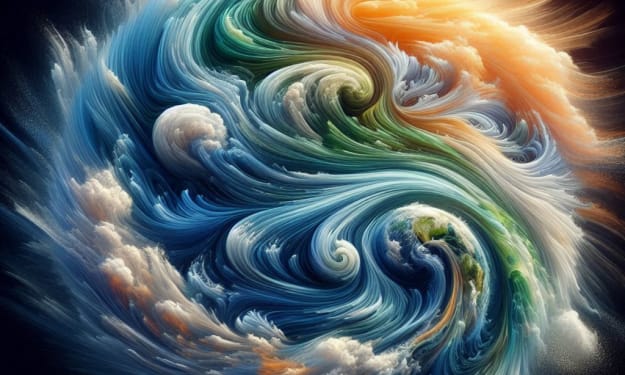Did the future already happen-The paradox of time?
How time works
Did the Future Already Happen? The Paradox of Time
Do your past, present, and future all exist simultaneously? Is it possible that you are watching this video, being born, and lying on your deathbed all at the same time? Surprisingly, the answer could be yes. But how can that be? What does that even mean? How does time work?
Imagine the universe as a child painting pictures on paper. Each picture captures everything happening in the universe at a single moment. With each new moment, events occur everywhere—people are born and die, galactic civilizations expand, you miss the bus—and our universe-child creates a new picture that replaces the old one. This way, you get something like a movie—only the moment we're in right now is real. The past is what happened before; now it’s gone. The future is still to come and hasn't been drawn yet. This is how time feels, right? Each moment is replaced by the next one. The past is far behind us; the future doesn’t exist.
But what if time is something else? What if the universe-kid has already finished all its drawings and stacks them on top of each other? This way, we get a block—a block of time that contains the whole history of the universe. All moments that have ever existed or will ever exist. In this block, the past, present, and future are equally real and exist at the same time.
This feels wrong—the only things that we perceive as real are those happening now. How can the past and future be real right now? The problem is that, according to the theory of relativity, they kind of have to be. Relativity says that time and space are not separate, but one connected spacetime. When you move through space, you are also moving through the block. This means time passes differently for different people, depending on how they move through space relative to each other. This also means that what someone perceives as “now” is a certain cut along the block—a cut that will depend on how fast they are moving.
So what you think is “now” is really only your now—there are many different “nows” in the universe and all of them are equally real. This also means there is no universal past or future.
Imagine three alien spaceships a million light-years away. The first one just hovers in space, not moving relative to you. You both experience the same “now,” the same present. If you had a magical instantaneous internet connection, you could do a video call right now and chat about alien things. The second spaceship is flying away from us at 30 km/s, about three times faster than a human rocket. It is moving differently through the block of time than you are, which means its “now” is different from yours. With the magical internet, the aliens can talk to your ancestors in 1924, when humanity was discovering the first galaxies outside the Milky Way. The third spaceship wants to visit Earth and is flying towards you at 30 km/s, moving at the opposite angle of the second ship through the block of time. It experiences yet another “now”—with the magical internet, the aliens can talk to your descendants in the year 2124, when humanity has already built cities on Mars and Venus.
So we have three different “nows”—so which one is correct? Well, that’s the problem. Relativity is based on one powerful principle—cosmic democracy: the fact that the point of view of all observers in the universe is equally valid. All those “nows” have to be equally real. But if this is the case, your past, present, and future all have to exist at the same time, right now! Because the different aliens, all happen in their present.
This means that the distinction between the past, the present, and the future is an illusion. The universe is not a bunch of things evolving through time, like in a movie—but a static block in which the past, the present, and the future all coexist and are real.
How can that be? Well, think about a galaxy outside the observable universe, too far away to ever visit or see. But even if you can’t get there and don’t see it, it is still real. The future might be the same! But if the past is not far behind us and the future actually exists, then there is no “movie.” Things don’t happen in the universe. The universe just “is”—like a frozen block of dead, cosmic ice, with everything that will ever happen already written and decided.
Is the Future Already Written?
If all times coexist and are equally real, then the future has to be already written. But that’s not how you experience things. It feels like you can mould your future with your decisions. It really feels like you're free to choose to stop watching YouTube to not miss the bus. But if the future is set in stone, you can’t “decide” anything. So are your choices an illusion? Well… maybe. Maybe your free will is a mirage. And maybe you missing the bus was already predetermined at the Big Bang, so feel free to continue watching.
Except...quantum stuff is ruining everything again. Quantum processes can’t be predicted, not even in principle. Not because we are silly and don’t know how to do it—according to quantum physics, quantum particles are intrinsically random. For example, if you have a radioactive atom, it could decay at any moment, in the next second or in the next million years. We can calculate the probability that it will decay tomorrow, but no oracle in the universe will ever be able to tell you with absolute certainty if it will do so or not. But quantum particles can change the world. Imagine a radioactive element randomly decays and causes a genetic mutation in a nearby mammal. And then many generations later that mutation has led to a weird mix of duck and mammal that makes no sense. Or the atom decays a day later and the weird creature will never exist.
If quantum stuff is really uncertain, the future can’t be set in stone. But if the future is an untold story, it can’t be real in the same way as the past is.
So what happens when uncertain things, like the decay of our atom, become real? Is that moment the present? Is this “now”? But before we saw that cosmic democracy makes it impossible to define an absolute “now.” What’s going on here?
It turns out that for every individual object—you, an alien, an atom—the past, the present, and the future are always well-defined. Your death will always happen after your birth—never before, and never at the same time. Now you are clearly between your birth and your death. So for you at least, "now" makes perfect sense.
If we don’t play tricks like going to the other side of the universe and using aliens in funny ways to find out what “now” means, things again start to look ordered and nice, and individual “nows” seem to exist. Can we do something with them? Let’s return to our block universe. Maybe the block does not contain the future—and maybe we just imagined it wrong. Maybe the block is just the past, and a thin layer on the surface is the present. That surface is not smooth, but bumpy and uneven. It’s been made by joining countless individual “nows”—each experienced by someone or something in the universe, each equally real and valid. And all observers do their bit, so cosmic democracy is still true.
As new things happen and uncertain things become certain—radioactive atoms decay, new species of mammals arise, people miss the bus—the border moves upward, creating new time in the universe. Instead of a frozen block of time with a future that has already been written, the block is growing and things happen. You can again decide your future! Maybe leave earlier so you won’t miss the bus!
Recap
We started with time as a movie—one “now” after another, where only the current “now” was real. Then we found out that because of relativity there are multiple “nows,” all of them real somehow—which could mean that we are living in a frozen block universe where things don’t happen and you don’t really have free will. And we ended up with a kind of growing block universe, where time passes and the future is open.
So which is correct? What is real? The present? The past? Are the dinosaurs as real as you are right now? What do the aliens on the other corner of the universe think about all this? To be honest, no one knows. What we’ve learned are two possibilities to describe time, but they're not the only ones. Some scientists think that the idea of “now” only makes sense near you, but not in the universe as a whole. Others think that time itself doesn’t even exist—that the whole concept is an illusion of our human mind. Others think that time does exist, but that it's not a fundamental feature of the universe—rather, time may be something that emerges from a deeper level of reality, just like heat emerges from the motion of individual molecules or life emerges from the interactions of lifeless proteins.
About the Creator
Pauline Steven
Pauline is a dedicated educator with 13 years of experience at a COBIS-certified Cambridge international school in East Africa. Passionate about fostering dynamic, inclusive learning, she also champions Round Square principles in education.
Enjoyed the story? Support the Creator.
Subscribe for free to receive all their stories in your feed. You could also pledge your support or give them a one-off tip, letting them know you appreciate their work.





Comments (1)
Pauline Steven is not accepting comments at the moment
Want to show your support? Send them a one-off tip.